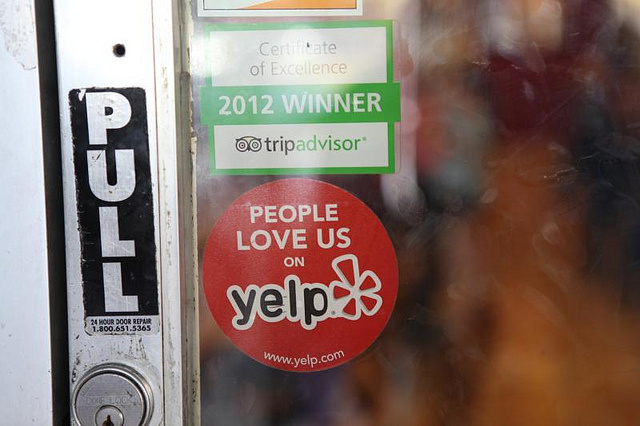
A federal judge has thrown out a lawsuit alleging Yelp manipulated reviews in an attempt to coerce businesses to buy advertisements.
Lawyers representing a Yelp shareholder filed suit in August of 2014, saying that the company had misled investors with false statements about the veracity of its reviews.
The complaint, which sought class action status, was filed four months after The Wall Street Journal revealed that the Federal Trade Commission had received more than 2,000 complaints about Yelp. The WSJ article roughly correlated with a significant drop in the value of Yelp stock.
Yelp has an algorithm that tries to identify reviews that may not be reliable, and it sometimes puts reviews in a "not recommended" area that's hidden from viewers at first glance. The company flatly denies ever manipulating reviews in advertisers' favor, writing on its website that "there is zero relationship between the timing of when a review gets recommended and when a business decides to—or declines to—advertise."
Plaintiffs in this case said those statements were proven false by the WSJ coverage and the FTC complaints. They also stated Yelp would "often offer to suppress negative reviews for a fee."
But US District Judge Jon Tigar dismissed the plaintiffs' complaint for the second time, agreeing with Yelp that the allegations were "insufficient to demonstrate falsity."
"[M]any of the customer complaints relied on by Plaintiffs hinged on the customers’ inferences of misconduct, rather than concrete examples of Yelp’s behavior," wrote Tigar in his order. "The Court concluded that these complaints failed to establish any significant pattern of misconduct tending to prove that Yelp’s denials of manipulation were false."
Further, Yelp's statements that it "employ[s] proprietary filtering technology to analyze and screen all of our reviews" doesn't mean that Yelp directors or officers knew about an "alleged illicit advertising scheme." The statement shows that "the majority of Yelp’s monitoring is done automatically and without human intervention," Tigar noted.
Tigar, who dismissed an earlier version of the complaint in April, noted that the plaintiffs had now failed at a second attempt to "plead with particularity" that Yelp had made misleading statements or that shareholders had experienced any loss from its statements. He dismissed the lawsuit with prejudice.
The opinion was published on Monday and reported by Reuters earlier today.
"Yelp has said from the beginning that this lawsuit—like others asserting similar theories—was without merit, and once again the court has agreed with us," a company spokesperson told Ars via e-mail. "Yelp has repeatedly stated that it does not manipulate reviews in favor of advertisers or against non-advertisers, and the court saw through plaintiffs' attempts to cast these statements as false."
Yelp has seen disputes over alleged review manipulation before, but when the matter has gone to legal authorities and regulators, the company's critics have consistently come out on the losing end. The US Court of Appeals for the 9th Circuit examined lawsuits over the issue and found that Yelp's ad sales strategies amounted to no more than "hard bargaining." Earlier this year, the Federal Trade Commission concluded a "deep inquiry" into Yelp's business practices and decided not to take any action against the company.
reader comments
51